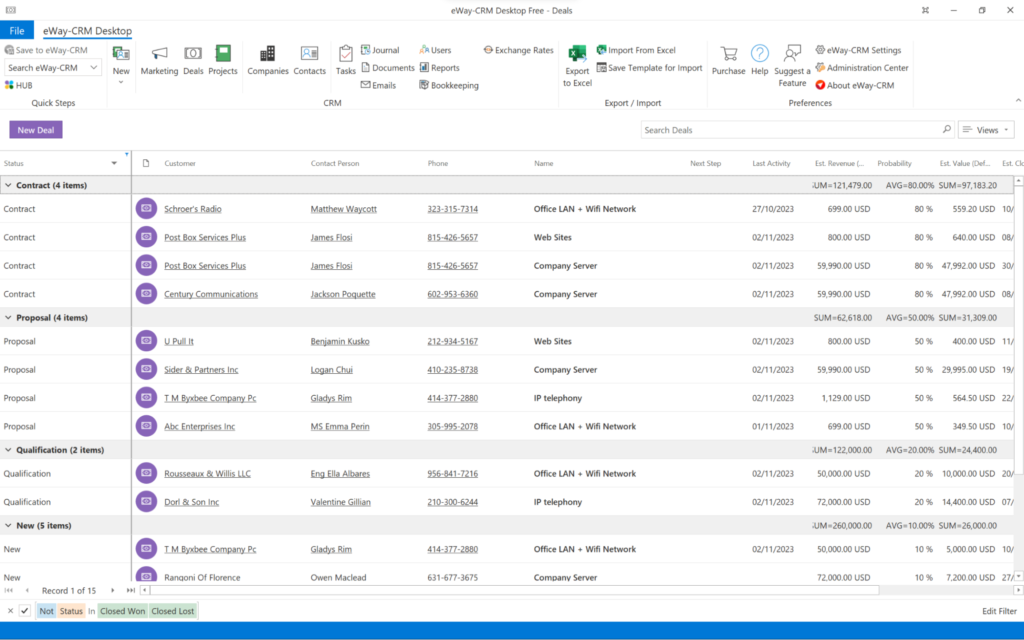Finding the right CRM for your small business can be challenging. Many options are available, but not all are affordable.
Small businesses often operate on tight budgets. Investing in expensive CRM software might not be feasible. Luckily, there are several free CRM solutions designed specifically for small businesses. These tools help manage customer relationships without breaking the bank. They offer essential features like contact management, sales tracking, and customer support.
Free CRMs can streamline your operations and boost productivity. In this post, we’ll explore the best free CRM options for small businesses. Whether you’re just starting out or looking to switch, these tools can help you grow. Stay tuned to find the perfect fit for your needs.
Table of Contents
Introduction To Free Crm Tools
Customer Relationship Management (CRM) tools are essential for small businesses. They help manage customer interactions, track sales, and streamline processes. Many small businesses struggle with budgets, making free CRM tools an attractive option. These tools offer essential features without the financial burden. Let’s explore the importance and key features of free CRM tools for small businesses.
Importance Of Crm For Small Businesses
CRM tools help small businesses organize customer data. This leads to better customer relationships. With a CRM, you can track sales and manage leads efficiently. It also helps in understanding customer needs and preferences. This improves customer satisfaction and loyalty. A CRM system saves time and reduces manual work, freeing up resources for other tasks. This is crucial for small businesses with limited staff. Overall, a CRM tool enhances productivity and drives growth.
Key Features To Look For
Free CRM tools come with many useful features. Look for contact management, which keeps all customer information in one place. Sales tracking is another vital feature. It helps monitor the sales pipeline and forecast revenue. Task management is also important. It ensures that all team members stay on top of their responsibilities. Email integration is useful for communicating with clients directly from the CRM. Reporting and analytics help you make data-driven decisions. Customization options allow you to tailor the CRM to your business needs.
Top Free Crm Options
Choosing the right CRM can greatly enhance your small business efficiency. But what if you don’t want to spend money on a CRM? Fortunately, some excellent free CRM options are available. Here, we’ll explore two top free CRM tools that can suit your small business needs.
HubSpot CRM is a popular choice among small businesses. It offers a wide range of features for free. You can manage up to one million contacts without paying a penny. The platform is user-friendly and easy to set up. HubSpot CRM provides contact management, deal tracking, and task management. It also integrates well with other HubSpot tools like marketing and sales.
HubSpot CRM allows you to track emails and schedule meetings. Its reporting dashboard gives you valuable insights into your business performance. You can also use the mobile app to manage your CRM on the go. For small businesses, HubSpot CRM is a solid and cost-effective choice.
Zoho CRM is another great free option for small businesses. It offers a range of features to help you manage your customer relationships. You can manage up to three users for free. Zoho CRM provides lead management, contact management, and sales automation. The platform is intuitive and easy to navigate.
Zoho CRM integrates with many third-party applications. It also offers a mobile app for managing your business on the move. You can customize the CRM to fit your business needs. Zoho CRM’s analytics and reporting tools provide valuable insights. For small businesses, Zoho CRM is a reliable and free CRM solution.
Hubspot Crm
HubSpot CRM is a top choice for small businesses seeking a free CRM solution. It offers a suite of tools to help manage customer relationships efficiently. Whether you are tracking leads, engaging with customers, or analyzing business performance, HubSpot CRM can be a valuable asset.
Features Of Hubspot Crm
HubSpot CRM comes packed with features that cater to the needs of small businesses. Here are some key highlights:
- Contact Management: Store and organize customer information effortlessly.
- Email Integration: Sync your email with the CRM for seamless communication.
- Sales Dashboard: Get a real-time view of your sales pipeline.
- Task Management: Assign and track tasks to ensure nothing falls through the cracks.
- Reporting: Generate detailed reports to analyze business performance.
Pros And Cons
Like any software, HubSpot CRM has its strengths and weaknesses. Here’s a breakdown:
| Pros | Cons |
|---|---|
|
|
Zoho Crm
Zoho CRM is a popular choice among small businesses for its free plan. It offers a range of features that help manage customer relationships efficiently. This platform supports sales, marketing, and customer support activities all in one place.
Features Of Zoho Crm
Zoho CRM provides a comprehensive set of tools. These include contact management, lead generation, and workflow automation. The platform also integrates with popular apps like Gmail and Google Drive. This makes it easier to manage your business operations.
Other features include sales forecasting, reporting, and email marketing. The mobile app ensures you can access your data on the go. Zoho CRM also offers a customizable dashboard. This allows you to see the metrics that matter most to your business.
Pros And Cons
One major advantage of Zoho CRM is its free plan. It supports up to three users, which is ideal for small teams. The platform is user-friendly and easy to navigate. You don’t need technical skills to get started.
On the downside, the free version has limited features. Advanced functions like AI tools and customization options are only available in paid plans. Some users may find the interface a bit overwhelming at first. Also, customer support for free users is limited to forums and email.
Comparing Hubspot And Zoho
Choosing the best CRM for your small business is important. HubSpot and Zoho are two popular options. Both offer free versions, but which one is better for you? Let’s compare them based on ease of use and customization options.
Ease Of Use
HubSpot is known for its user-friendly interface. Beginners find it easy to navigate. The dashboard is clean and simple. You can quickly access all important features. There is no steep learning curve.
Zoho, on the other hand, has more features. This can make it look complex at first. It might take some time to get used to it. But once you do, it becomes easy to handle. It offers a guided setup for new users.
Customization Options
HubSpot offers limited customization in its free version. You can customize contact properties. But advanced options need a paid plan. This might be a downside if you need more flexibility.
Zoho provides more customization even in the free plan. You can customize modules, fields, and layouts. This makes it suitable for businesses with specific needs. It also allows third-party integrations easily.
| Feature | HubSpot Free | Zoho Free |
|---|---|---|
| Ease of Use | User-friendly, simple dashboard | Feature-rich, initial complexity |
| Customization | Limited in free plan | Extensive even in free plan |

Credit: www.cxtoday.com
Other Notable Free Crms
When exploring the best free CRMs for small businesses, several options stand out. These tools offer essential features at no cost. They help manage customer relationships, streamline processes, and boost productivity. Here are a few notable free CRMs that you should consider.
Insightly
Insightly is a popular choice among small businesses. It offers a user-friendly interface. You can manage contacts, tasks, and projects. Its free plan supports up to two users. Insightly also provides basic reporting and email tracking. This makes it easier to monitor customer interactions. Additionally, it integrates with Google Workspace and Office 365.
Agile Crm
Agile CRM is another excellent free option. It combines sales, marketing, and service automation. The free plan includes up to 10 users. You get contact management, email tracking, and appointment scheduling. Agile CRM also offers marketing automation features. These include email campaigns and web engagement tools. Furthermore, it integrates with popular apps like Gmail and LinkedIn.
Choosing The Right Crm
Choosing the right CRM for your small business is crucial. It can streamline your operations and help you better understand your customers. This section will guide you through assessing your business needs and considering scalability before making a choice.
Business Needs Assessment
Start by identifying what you need from a CRM. Do you need help with customer data management, sales tracking, or marketing automation? Make a list of must-have features. This will help you narrow down your options.
Consider your team’s workflow. A CRM should fit seamlessly into your daily operations. It should enhance productivity, not complicate it. Look for user-friendly interfaces and easy integration with existing tools.
Scalability Considerations
Your business will grow. Your CRM should grow with you. Assess if the CRM can handle more data and users as your business expands. Look for flexible plans that can scale with your needs.
Check for customization options. A scalable CRM allows you to add new features and modules. This ensures it remains useful as your business evolves.
Think about long-term costs. A free CRM is great for now, but can it support your future growth? Compare the pricing plans for advanced features you might need later.

Credit: crm.org
Implementing A Crm System
Implementing a CRM system can boost your small business operations. It helps manage customer relationships, track sales, and streamline processes. A CRM system also allows for better data organization, ensuring you never miss a follow-up. Here’s how to implement a CRM effectively.
Training Your Team
Training your team is crucial for CRM success. Start with a basic introduction. Explain the benefits and features of the CRM. Use simple language and real-life examples. Provide hands-on training sessions. Let your team explore the system. Encourage questions and feedback. Offer ongoing support and resources.
Integrating With Existing Tools
Integrating the CRM with your existing tools is essential. Check compatibility with your current software. Look for easy integration options. Connect your email, calendar, and other essential tools. Ensure data flows smoothly between systems. This saves time and reduces manual work. Your team will appreciate the seamless experience.

Credit: zapier.com
Frequently Asked Questions
What Is A Crm For Small Business?
A CRM helps manage customer relationships, track sales, and organize contacts.
Are There Free Crms For Small Businesses?
Yes, many CRMs offer free versions with essential features for small businesses.
Which Crm Is Best For Small Businesses?
HubSpot, Zoho, and Freshsales are popular free CRMs for small businesses.
Do Free Crms Have Enough Features?
Free CRMs often provide basic features like contact management, email tracking, and sales automation.
Can Small Businesses Benefit From A Free Crm?
Absolutely. It helps organize customer data, improve communication, and increase efficiency without extra costs.
Is Hubspot Crm Free For Small Businesses?
Yes, HubSpot offers a free CRM with features like contact management and email tracking.
How Do I Choose A Free Crm?
Consider your business needs, ease of use, and the features offered by the CRM.
Do Free Crms Support Mobile Access?
Many free CRMs, like Zoho and Freshsales, offer mobile apps for on-the-go access.
Conclusion
Choosing the best free CRM for small businesses can be challenging. With the options discussed, you can find a tool that fits your needs. These CRMs can help you manage customer relationships efficiently. They also save costs while boosting productivity.
Start exploring these free CRM tools today. Your business deserves the best support. With the right choice, you can streamline operations and grow. Consider the features and benefits each offers. Make an informed decision and see the positive impact on your business.









